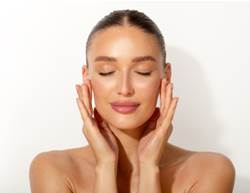The concept of a pill that aids your beauty regimen is still relatively new, even though it’s a trend that’s spreading fast. There have been some promising studies, but the infancy of this kind of product means we still have a lot to learn about the long- term benefits. Still, we spend so much money on what we put on our face – from skincare to make-up – that it makes sense to think about how we nurture our skin from within.
“Targeted dietary interventions, including stand-alone ‘ingestibles’, have emerged in response to increasing evidence that inner health affects outer health; and that those nutrients which benefit immunity, wellbeing, mental health and gut health may also benefit skin health,” explains Dr Adam Sheridan, dermatologist and director of the Specialist Dermatology, Surgery and Laser clinics in Melbourne and Adelaide.
So what do these pills and supplements do?
Beauty supplements certainly seem to be the skin-food that our dreams are made of, yet independent, large-scale clinical studies into their effectiveness are few and far between, so the results are hard to quantify.
“There are small studies to show some benefits of certain key ingredients but these are usually very potent extracts – you need to have them in large amounts, especially if you’re having them orally,” says accredited practising dietitian, Brooke Longfield. “The difficulty is that the studies are not always reproducible in different people. There are so many variables that you might not have the same results as someone else.”
It’s all about taking a holistic approach to our skin and health according to Di Mitchelmore, Bachelor of Science in Immunology and Nutritional Biochemistry (Bsc) and Swisse national training manager. “Skin is our largest living organ and is rich with blood vessels that feed the regeneration of new skin cells, so optimal health is critical to our skin quality,” she says.
What to look out for
This is what we know: lifestyle factors, stress, environmental pollution and sun exposure can all affect the appearance of our skin. “We’re exposed daily to so many stressful elements in our lives. We might be tired, busy, stressed, not eating as well as we should. Add to that the strong UV rays in Australia and the potential damage that causes, and there are definitely benefits to looking at how to maximise our skin health,” Longfield says.
“All of these things affect how we feel, look and how our skin reacts. Prolonged exposure to this stress can contribute to premature ageing. Some research shows that you can use the potent extracts of healthful ingredients in supplements to look after your skin from the inside, but we also need to think about our lifestyle as a whole including diet, exercise and sun protection.”
Some minor studies have suggested that there are benefits to bolstering our skin with proteins and amino acids from within. One, from the Journal of Cosmetic Dermatology found that collagen supplements may increase skin hydration and boost collagen density.
Another study found that biotin has been shown to increase nail thickness by 25 per cent (making them less susceptible to breakage). Small investigations into the use of fish oil discovered that daily devotion to the by-products of our scaly friends may have a hand in healthy hair growth, skin regeneration and treating conditions such as psoriasis.
“Ingestibles are based on the same proteins, vitamins and minerals known to support healthy skin function and repair when consumed in a healthy diet,” Sheridan explains.
Different types of supplements
Though not yet widely studied, ingestibles have opened up a promising new avenue for slowing your skin’s ageing clock and keeping your complexion soft, supple, and glowing. The current ‘it’ ingredients for ingestibles include:
PLANT EXTRACTS
Turmeric and curcumin “Studies show that turmeric and its most active ingredient, curcumin, have antioxidant and anti-inflammatory benefits,” Sheridan says. US research shows that turmeric can inhibit growth of melanoma and speed the healing of skin after burns and scalds.
Cacao powder
This bitter-tasting bean contains nearly double the amount of antioxidants found in red wine and up to three times more than those found in tea, research from Cornell University shows. According to Janella Purcell, naturopath, herbalist and author of Janella’s Super Natural Foods (Allen and Unwin), “Cacao powder is a good source of skin-boosting nutrients, such as amino acids, protein, iron, calcium, potassium, copper, zinc, sulphur and the calming mineral, magnesium.”
Pea protein
This bright green powder is loaded with nutrients and fibre. It is high in an amino acid called lysine. US research shows that lysine can increase collagen, which gives skin its strength and elasticity. Other nutrient-rich vegetable powders such as beetroot, potato and cauliflower are also increasingly being used in ingestibles.
Maqui berry
Research from the University of Illinois shows this berry is high in the many antioxidants that may help protect skin from sun damage and potentially help keep skin looking younger and firmer.
MARINE EXTRACTS
Seaweed
Available in many varieties (such as kelp, dulse, wakame, arame, nori and kombu), “Seaweed is packed with minerals, iodine and omega-3 oils and its health-promoting qualities make for glowing skin and shiny hair,” Purcell says. “Seaweed can also help combat iodine deficiency, which can cause issues such as flaky skin.”
Chlorella
This single-celled blue-green algae grows in sunny areas in fresh water. “It is rich in chlorophyll, the pigment that makes plants green and it has ‘cracked’ cell walls which appear to attach to, and help break down, pollutants and chemicals, reducing their impact on skin health,” Purcell says.
Spirulina
This spiral-shaped salt-water blue- green microalgae is so nutritious that NASA has studied it for use in space. “It has been found to be richer in folate, zinc and selenium than many land vegetables,” Sheridan says.
Fish scales
“Extracts from fish are high in omega-3 fatty acids and collagen,” Sheridan says. Research shows that omega-3 fatty acids may reduce inflammation related to acne, and may also protect against skin cancer.
THE GUT SKIN CONNECTION
If you want extra nutritional punch in your ingestible formula look for prebiotics and probiotics.“People with unsettled, inflamed or irritable bowel often have an underlying imbalance of their belly bacteria,” Sheridan says. “This gut-skin feedback loop can sometimes result in skin issues such as dermatitis, hives, acne and other skin conditions.” Studies suggest that probiotics (healthy bacteria such as Lactobacillus and Bifidobacterium) can combat a range of skin conditions, including eczema and psoriasis. Prebiotics such as asparagus, dandelion greens, Jerusalem artichoke, chicory, onions, leek and garlic contain fibre compounds that healthy bacteria feed on, so they are also included in some ingestible formulations.
QUALITY COUNTS
“Before buying any ingestible, read the label to ensure the formula does not contain fillers, sweeteners, preservatives and artificial additives, which won’t benefit your skin,” advises naturopath Janella Purcell. The key ingredient you want in your supplement should be top of the list – the further down it is, the less of that ingredient your ingestible formula contains.
For the most up-to-date information on leading skin advancements, sign up to Prevention's weekly newsletter.









